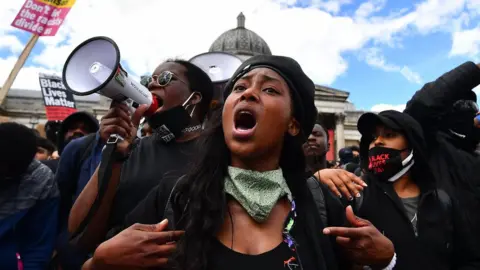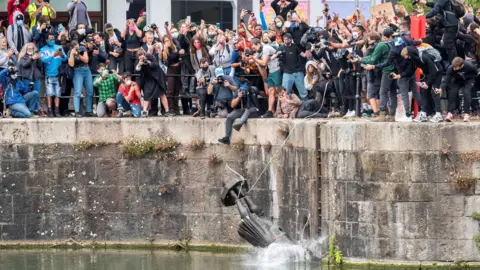Black Lives Matter: 'Much more that we need to do' to tackle racism - PM
 PA Media
PA MediaThere is "much more that we need to do" to tackle racism, Boris Johnson has said as he announced a new commission to look at all "aspects of inequality".
Writing in the Telegraph, the PM said "no-one who cares about this country" could ignore the anti-racist protests sparked by the killing of George Floyd.
But Labour's David Lammy said it was time for action, not another review.
The PM also said the UK should not attempt to "re-write the past" by removing historical symbols.
The UK's heritage should be left "broadly in peace", he added.
Mr Johnson condemned the "far-right thugs" involved in violent protests on Saturday, which saw more than 100 people arrested in London after thousands gathered saying they were protecting statues.
He said their mission was "utterly absurd" but he added that it was "deplorable" that Sir Winston Churchill's statue had been in danger of attack.
It comes after the statue in Parliament Square was spray-painted with the words "was a racist" last weekend. In Bristol, anti-racism protesters pulled down a statue of slave trader Edward Colston.
Thousands of people have marched in the UK as part of Black Lives Matter demonstrations following the death of George Floyd in Minneapolis last month.
The prime minister said he was setting up a commission to look at inequality as it was "no use just saying that we have made huge progress in tackling racism".
He wrote: "There is much more that we need to do; and we will. It is time for a cross-governmental commission to look at all aspects of inequality - in employment, in health outcomes, in academic and all other walks of life."
Questions over inequality in health outcomes have been repeatedly raised during the coronavirus pandemic after figures showed more people from ethnic minority backgrounds were "disproportionately" dying with the virus.
'Time for action'
Shadow justice secretary David Lammy said a number of inquiries into racial inequality had already been carried out, such as his own report on the treatment of black, Asian and minority ethnic individuals in the criminal justice system and Theresa May's Race Disparity Audit.
"You can understand why it feels like, yet again in the UK, we want figures, data, but we don't want action," he told BBC Radio 4's Today programme.
"Black people aren't playing victim as Boris indicates, they're protesting precisely because the time for review is over and the time for action is now."
Mr Lammy said the announcement lacked detail because it was "written on the back of a fag packet yesterday to assuage the Black Lives Matter protest".
He called for legislation and the recommendations of past reviews to be implemented.

What work has already been done on racial inequality in the UK?
- The Race Disparity Audit, published by then Prime Minister Theresa May in 2017, showed inequalities between ethnicities in educational attainment, health, employment and treatment by police and the courts
- The 2017 Lammy Review found evidence of bias and discrimination against people from ethnic minority backgrounds in the justice system in England and Wales
- Also in 2017, the McGregor-Smith Review of race in the workplace found people from black and minority ethnic backgrounds were still disadvantaged at work and faced lower employment rates than their white counterparts
- An independent review of the Windrush scandal, published in March, found the Home Office showed "institutional ignorance and thoughtlessness towards the issue of race"

BBC assistant political editor Norman Smith said the new commission would be run out of the Cabinet Office and report to the prime minister, and it would be asked to finish its work by Christmas.
A chair has not yet been identified but the commission will be overseen by Equalities Minister Kemi Badenoch, with independent members also on the panel.
There are expected to be public evidence sessions and legislation may follow.
Lord Simon Woolley, founder of Operation Black Vote and the advisory chair of the government's Race Disparity Unit, said he was "encouraged" by the announcement of the commission.
However, he said it must lead to action and structural change, to tackle the inequalities in employment, health and education laid bare by the pandemic.
Labour's shadow equalities secretary Marsha de Cordova said: "We are in the midst of a global health pandemic that has sharply exposed deep structural inequalities which have long since needed urgently addressing."
She criticised some of Mr Johnson's words, after he told broadcasters he wanted to "change the narrative so we stop the sense of victimisation and discrimination".
Ms de Cordova described this as "condescending" and "designed to let himself and his government off the hook".
Lord Woolley also said the phrase was "frankly unhelpful… unnecessary and to some hurtful".
Liberal Democrat equalities spokesperson Christine Jardine said the commission was a "welcome first step" and showed the Black Lives Matter protests were working.
But she added: "Its findings must not become simply another report on a shelf in Whitehall - the government must implement them without delay."
Meanwhile, a survey of people's attitudes to race in Britain carried out during recent protests suggests people are increasingly optimistic that the UK will become more tolerant and diverse.
When asked if they were optimistic Britain would be more tolerant and diverse in 10 years' time, two thirds of people polled by Ipsos Mori said they were, up from half in 2009. And 84% of people strongly disagreed when asked if someone has to be white to be truly British - up from 55% a decade earlier.
 Reuters
ReutersMr Johnson said the "serious points" being raised by the anti-racism demonstrators should be taken seriously.
However, he said that did not mean "wasting time" disputing the life and opinions of "every historical personality currently immortalised in bronze or stone".
"Let's fight racism, but leave our heritage broadly in peace. If we really want to change it, there are democratic means available in this country - thanks, by the way, to Winston Churchill," he said.
It comes as English Heritage is reviewing London's 950 blue plaques to check if any have "problematic" connections and will warrant extra context published about them online, as first reported in the Times.
As for statues, English Heritage also said it believes the best course of action is to give extra context to ensure the stories of individuals are told "without embellishment or excuses".
